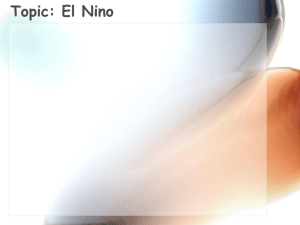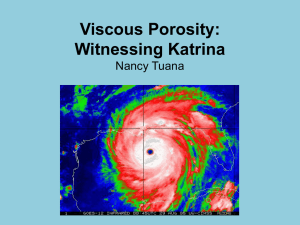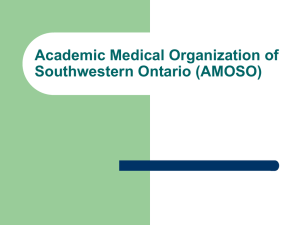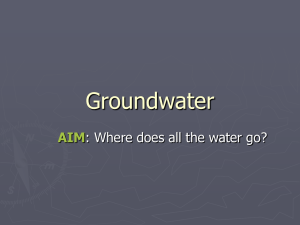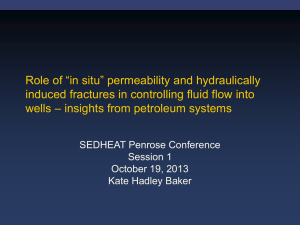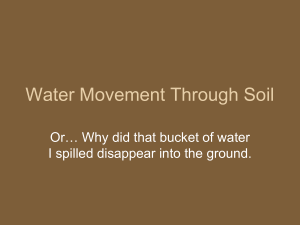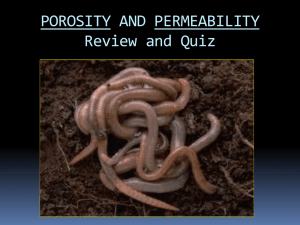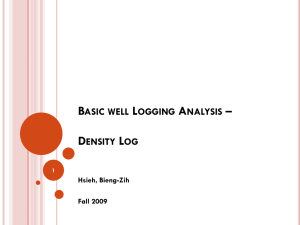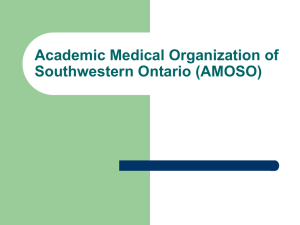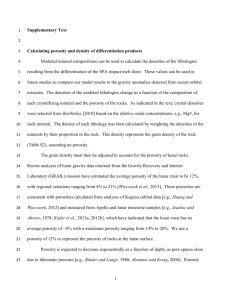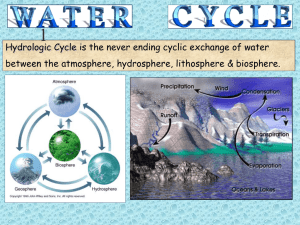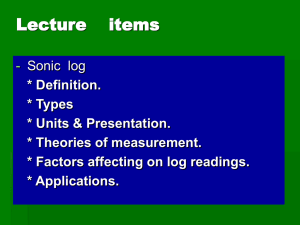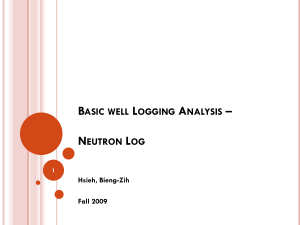Nathan Ferverda - Crop Production Services
advertisement
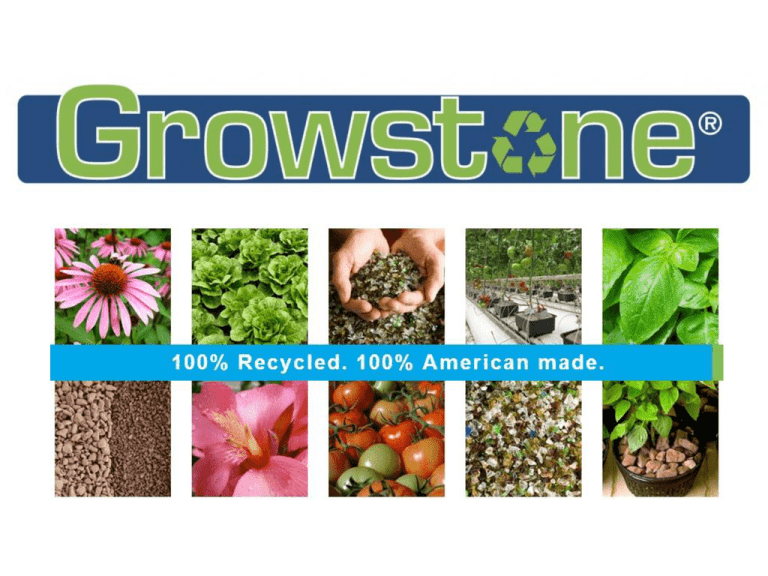
Choosing Growing Media • Success of any plant production system depends in part to proper root growth and development • Root zone health tends to lead to healthier plants with less pest problems and better yields • Each crop has a different ideal growing medium based on its physical characteristics Factors to Consider in Grow Media • Ratio between Water Holding Capacity (WHC) and Air Filled Porosity (AFP) – Crops need both Water and Oxygen in the root zone – Fast growth crops tend to benefit from a balance between WHC & AFP – Whereas, succulents usually benefit from low WHC and high AFP medias with easy drainage. – Rarely, will one type of medium meet the crop’s WHC & AFP requirements. Blends of various media are typically needed. Unless, special irrigation techniques are used (Hydroponics) Factors to Consider in Grow Media • Low Bulk Density and High Porosity – Bulk density is a measure of the mass of medium plus voids per unit volume – Typically, the lower the Lower the Bulk Density the Higher the total Porosity – High Porosity enhances gas exchanges between roots and atmosphere – These gas exchanges lead to more oxygen in the root zone which has a positive effect on root growth rates and a reduction in root diseases Factors to Consider in Grow Media • Bulk Density – Continued – Air Filled Porosity is important to consider after irrigations • Once watered how saturated is the media? • Is there still ample oxygen levels? • Best media should have a Total Porosity above 50% and contain at least 25 to 30% Air Filled Porosity at capacity. – Low Bulk Density Medium also has the benefit of being light weight when dry (less transportation costs) Factors to Consider in Grow Media • Easy to Drain – Drainage is influenced by the Media Texture – After irrigation the texture influences how much water is available to the plant – Heavy and Compacted Media hold more water – Highly Porous Media drains Faster • Faster Draining = faster exchange of Oxygen in root zone thus a Healthier crop. • Also allows for faster adjustment of fertilizer and pH • Easy to drain media is beneficial as it prevents water clogging and anaerobic conditions which lead to Root Rot & Diseases • In humid environments this is very important. Factors to Consider in Grow Media • Steer-ability – Ease of maintaining the crop between Vegetative and Reproductive growth • Uniformity of Particle Size Distribution – Promotes even moisture and air levels throughout • Chemically Inert – No or low Cation Exchange Capacity (CEC) allows complete control over nutrients • Reusable – How fast does the material break-down? • Ecological Impact of Acquisition – Strip Mined VS Repurposed What are Growstones? • Growstones are a Man-Made Growing Media – Can be used in many different applications • • • • Hydroponic Production Amendment to Soil or Soilless Mixes Biofilter for Aquaculture Mechanical Barrier for Fungus Gnat Control Recycled Repurposed Product • Growstones are Made from Recycled Glass • Other Media is Strip-Mined out of the Ground The Growstone Mine • Our production facility is located on the Albuquerque Municipal Landfill • Landfills will be the mines of the future! How we make Growstones Recycled Glass is pulverized into a powder. The powdered glass is mixed with a Foaming Agent and a pH Buffer. This mix is then spread onto a sheet conveyer and run through our furnace. It starts its journey at ½” thick. Our furnace is about 100ft long and reaches temperatures of 1600 degrees. The now Foamed Glass immerges from the furnace in a continuous sheet. That is around 4” thick. The Foamed Glass is cooled and crushed. We then screen the crushed product for each of our products. Growstone Porosity Comparison Growstones have 31% Water Holding Capacity (WHC) & 51% Air Filled Porosity (AFP) Trials at University of AZ & WUR of Netherlands • Crops – Tomato & Cucumber • Duration – 2 Years • Conclusions – Reduction in Blossom End Rot – Faster Production of Fruit – Yielded 4% more Fruit – Reduction in Pythium 15 to 1 * In comparison to Rockwool Media Soluble Silica • Since Growstones are made from Glass they release soluble Silica (monosilicic acid H4SiO4) • The Si content varies between 0.25 and 1.20 millimoles per liter (mmol/L) • Studies at UC Davis have shown that Si increases plants resistance to Fungal Diseases, Plant Parasites such as Pythium and Chewing Insects such as Leaf Miners. • Silica should be a part of an IPM program since it thickens the leaf cuticle making it harder for pests to break the leaf surface, reducing the need for certain pesticides. • Fruits grown in Growstones have shown a thicker skin. This could be beneficial during transport and a longer shelf-life. Growstone Products GS-1 Hydroponic GS-2 Soil Aerator GS-3 Coco Mix Gnat Nix! Hydroponic • Growstone GS-1 Hydroponic – Standalone grow media • Alternative to – – – – Rockwool Expanded Clay Pebbles Pumice, Cinder Perlite – Aquaponics (Fish/Plants) • Grow media • Biofilter Blending with Soils • Growstone Mix This Soil Aerator • UofA study – increased Aeration 87% higher Air Filled Porosity (AFP) than Perlite • Long lasting in soil • Holds better in mix. Doesn’t float up • Releases Silica Coco Blend • Growstone GS-3 Coco Blend – Premixed Soilless Grow Media – 60% Growstone – 30% Sri Lankan Buffered Triple Washed Coco Fiber – 10% Redwood Fiber Gnat Nix! Unlike other top dresses that are limited to one phase of control, Gnat Nix! controls gnats at different points of their lifecycle. It prevents adult emergence from hatching larvae and deters females from laying eggs in the growing media. As a result, the lifecycle of fungus gnats is interrupted, and its population significantly reduced. • • • • • • No pesticide – safe for all crops Kansas State University Trials – Effective Wet or Dry Can be used day of harvest IPM programs - Reduces need for pesticide soil drenches Fungus Gnat Larva eat roots Root damage can lead to root rot, diseases, molds, etc Application: • Gnat Nix! is a Top Dress Mechanical Barrier • Should be applied to surface of grow media • For full control rate a ½” to ¾” thick layer is recommended • Maintain layer for control – reapply as needed IPM and Growstones • A media, with proper WHC & AFP, is one part of many that are key to overall plant health, which in turn, could reduce the amount of pesticides that would normally have to be used to combat insects, plant parasites, and fungal diseases that affect plants under stress in poor grow media. • Growstones provide a balanced WHC & AFP plus soluble Silica. • Clean – No stray seeds. No harmful pests hiding. A Revolutionary Product
